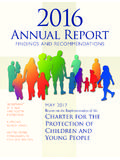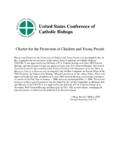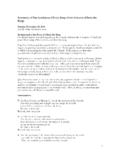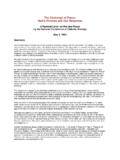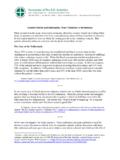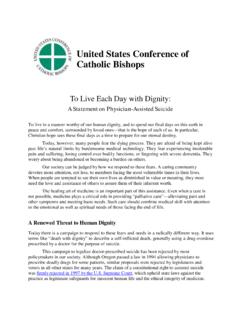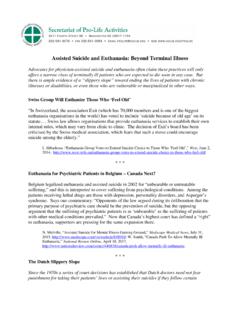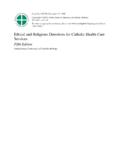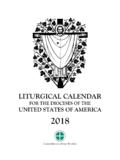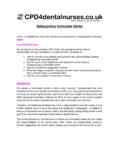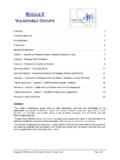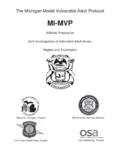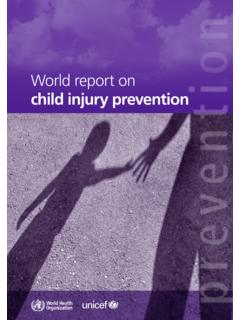Transcription of Prevention and Mitigation of Abuse of Vulnerable …
1 Prevention and Mitigation of Abuse of Vulnerable Adults "I tell you, if they keep silent, the stones will cry out!" [Luke 19:40] Introduction Dictionaries tell us that Vulnerable is defined to mean: -capable of being physically or emotionally wounded -open to attack or damage, assailable [ Vulnerable to criticism] So standing here before you merely presenting this very discourse puts me in a very Vulnerable position. Have mercy on this humble messenger. I could be an angel whom you might emotionally wound. We are all, therefore, through the ordinary actions of our comings and goings and our commitments each day, by definition Vulnerable . All of us, Children of God, loved, made good and on the path to perfection of God s love through the opening up of ourselves to God s will and desire for us, we place ourselves in a most Vulnerable position, all the while trusting in others to assist us, guide us, and nurture us.
2 It is a delicate balance we seek where we are open to God s will and confident in our chosen path, and determined in our Faith all at the same time. The Saints give us concrete examples of this, showing us clearly both the joys and sufferings of putting one s self in a Vulnerable position. Jesus, himself, became Vulnerable for love of us. Through His example we strive to be creatures that live in the sureness of Faith, while finding our way through Vulnerable times, places, and circumstances in our lives. If we strive for the opposite of Vulnerable , we meet invulnerable which is defined as invincible. We would find ourselves as persons living in a world that is bulletproof, impassable, impenetrable, impregnable, indestructible, powerful, secure, strong, unbeatable, and untouchable. 1 While at first glance these words evoke positions of power and privilege, and places that might offer peace of mind and heart, we see that they are words that do not in any way demonstrate the qualities of a good Christian minister.
3 The Synonyms for the word Vulnerable are accessible, assailable, defenseless, exposed, naked, on the line, on the spot, out on a limb, ready, sensitive, susceptible, tender, thin-skinned, unguarded, unprotected, unsafe, weak, wide open. And the Antonyms are closed, guarded, protected, safe, and secure. We see much power in words, if even only adding a prefix of a couple of letters that can change everything. So too can a title, position, or circumstance in life make all the difference in the way we perceive vulnerability embrace and accept it. For those with much, embracing the posture of vulnerability can mean either a great leap into the unknown or a small step toward it. It all depends upon the circumstances of support and resources available. For those with fewer resources, the movement toward vulnerability may be shorter in distance, but much more severe in cost to the person emotionally.
4 The measure cannot be quantified nor qualified for neither. Thus, we can never effectively compare the lives of those persons living with or without disabilities. How often are God s gifts overwhelming blessings to many, but become challenges to others? The Paradox of Vulnerability All of these introductory words, perhaps somewhat confusing, lead us to the great paradox of vulnerability. Vulnerability is most often associated with being helpless and weak. But we find that being Vulnerable affords us the opportunity to accept the kindness of others in ways that we never expected. Jesus example of the man born blind in John 9:3 is a perfect example of our Christian call to help those less fortunate than ourselves. Jesus answers the disciple s queries of why the man was born blind by stating: Neither he nor his parents sinned; it is so that the works of God might be made visible through him.
5 2 Being Vulnerable also makes one open to being hurt. Similar to when the disciples were asking Jesus about the origins of the man born blind s blindness and equating it to the common theological thought then that it was due to sin. When individuals use the vulnerabilities of others to label or take control of them, act out their frustrations or anger upon them, or exploit them, we are dealing with the most grave of sins. Hurting others who are defenseless is reprehensible. This problem has been cycled down through the ages in various forms presenting it in many ugly ways. Unfortunately, we seem to see the ugliness as something or someone far away from our reach and come to the rescue all too late. Most unfortunate is the fact that we have not eradicated it from our ways altogether. Carmelite Saint Teresa Benedicta (Edith Stein) having lived through the torments of the concentration camps summed up well our appropriate Christian response to these tragedies: The burden of the cross that Christ assumed is that of corrupted human nature, with all its consequences in sin and suffering to which fallen humanity is subject.
6 The meaning of the way of the cross is to carry this burden out of the world. Suffering brings us face to face with ourselves and each other in ways that are impossible to avoid. Pain gets our attention, and forces us to figure out what we stand for, which is what life and death are all about. The answers are not completely satisfying at the intellectual level. Thus, we find ourselves, reluctantly at first, on a pilgrimage with God through the worst of what humankind is capable of perpetrating. We are on a journey with God through the crushing realities the spring up right in the middle of our lives; sickness, death and the loss of fortune or friends, opportunities and dreams. What good answers could these possibly have? 1 Saint Theresa Benedicta hearkens back to the age old question the Disciples asked Jesus: Why is there suffering? Jesus response is clear making the works of God visible which is our duty, carrying the burdens of the cross out of the world.
7 1 Volume IV of the Collected Works of St. Edith Stein. The hidden life: hagiographic essays, meditations, spiritual texts. Sister Teresa Benedicta of the Cross Discalced Carmelite Edited by Dr. L. Gelber and Michael Linssen, 3We again see the great paradox Being Vulnerable isn t about being weak; it s about harnessing the necessary strength to be open and authentic. 2 Being true to our call as Christians is to seek God s power and grace working through us to give voice to every Vulnerable person we encounter. To further the paradox, we must find the various ways we can become Vulnerable ourselves so that we are open to healing and binding the wounds of others. Embracing the opportunities we see before us by taking on the posture of Jesus great mandatum is as unique as each of us has been specially created.
8 There is no prescription, no formula or specific way to carry the burdens out of the world. Simply put, we should be encouraged by paying close attention to our own interior life and be propelled from these graces to move forward in reaching out to give voice and to extend a hand to Vulnerable others. Focusing on being better at what we individually do best will create communities of care and concern for all where each voice, most especially Vulnerable unheard voices will be listened to and heard clearly. As leaders in our blessed Church, the opportunity to seek out the Vulnerable , listen to them and provide a plan for their safety and wellbeing. Our salvation history has proven over time that God keeps His promises to us. He would never leave us to sufferings without Hope. His grace working through all of us, from the weakest to the mightiest, empowers us to call forth the voices of those who have been silenced.
9 Our call is to protect them, and to raise them up as loved, cherished, and viable members of the community whose gifts are affirmed and encouraged. While each of us can be Vulnerable in any given situation or set of circumstances, we will look at four basic types of Vulnerable persons hearing from them in their own voice about their own experiences of Abuse . As I have discussed, Vulnerable adults can apply to people with physical, mental, or emotional conditions or an illness that renders them unable to defend themselves, protect themselves, or get help for themselves when injured or emotionally abused. The term applies as well to the elderly whose various circumstances make them Vulnerable to those who might cause them harm. 2 On Being Naked: The Great Paradox of Vulnerability: Katie, November 4, 2010. Health for the Whole Self, A Journey for Balance for Body, Mind Spirit.
10 Taken from the Internet 9/26/11. 4 Grooming Behavior Sexual Abuse of Vulnerable adults is as complex to understand as it is for us to comprehend the molestation of children. Among Vulnerable adults, the abuser s patterns are similar to the behavioral patterns of those who Abuse children. In particular, there are those who seek out and groom Vulnerable adults and those who take advantage of particular situations and give into the pressures of those events by abusing others. Those abusers, most unfortunately, are primarily found among the family members, caregivers, and others who are known and trusted by the Vulnerable adult. Grooming behavior is employed by predators who identify and engage their victims. It is a means for an offender to gain control of a Vulnerable adult and therefore their cooperation. The predator carefully and patiently grooms a Vulnerable adult for the type of relationship they seek.
